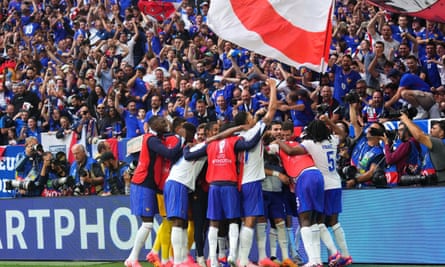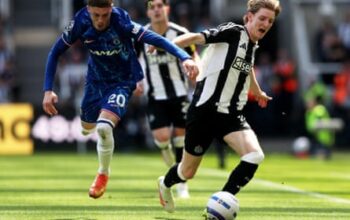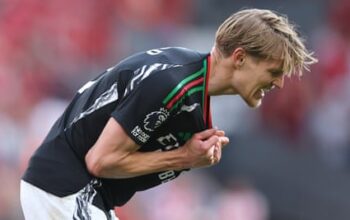In the end it took a grudging moment of light to decide a chilly, grey game at a chilly, grey Merkur Spiel‑Arena in Düsseldorf; a moment that also seemed to resonate just a little with the noises beyond the pitch.
Sport is often confused with politics. Sometimes, and frequently by design these days, sport is politics. Here we are. We are the dreamers. Lest we forget, Qatar’s ghost anthem for the missing workers of the great sporting power grab.
Randal Kolo Muani’s starring role in the only goal of the game for France against Belgium was three things simultaneously. Most simply it was a key moment in this tournament as France eased their way through a game that contained all the fluidity and carefree movement of a repeatedly collapsing rugby scrum.
It was a good moment for Kolo Muani, who has been injured and lost his mojo for a while, and who has some scar tissue already in his France career. Didier Deschamps brought him on with 10 minutes to go here. He ran eagerly and gave France a little more at the point of its attack.
The ball had been fizzed a little quicker across the face of the Belgian defence by the time it fell to Kolo Muani with 85 minutes gone. He had time to turn and shoot, in a game that had previously offered no time and no space. A deflection off Jan Vertonghen sent the ball ballooning into the Belgian net, an own goal according to Uefa, but enough to decide a messy game that France deserved to win, if only because Belgium rarely seemed to take any active part in it.
And so France will now progress to their quarter-final in Hamburg on Friday. A beaming Kolo Muani was grabbed and hugged and babied by his teammates at the final whistle. And in context it felt, however briefly, like one of those moments where sport does seem to be trying to offer you something, an asterisk to the wider world.
This France side is under pressure at this tournament. There are questions of legacy and reach for this group. There are those who like to say England have a golden crop of talent that is the envy of the world. Imagine if that was actually true. And if you were also football’s top global exporter of talent. And you had the best player in the world. Then you’d be France. It comes with a weight to carry.

There are other elements here, too. Most obviously the presence of successful and highly visible players such as Kolo Muani in this France team represents, in outline, something that is not National Rally, the immigration-fixated hard-right party that took the single largest share in the overnight parliamentary elections.
RN wants tougher controls on citizenship. RN wants to reduce access to certain jobs for people it sees as insufficiently French. Kolo Muani’s parents were born in Kinshasa. He holds dual nationality. He embodies, along with his teammates, a happy, functional tableau of people from a deep cut of French society.
Afterwards Jules Koundé said: “I was disappointed to see the direction France is taking, with strong support for a party against our values. The far-right party, National Rally, who are against freedom and are against our coexistence.”
Right now France’s footballers look like an island of calm compared to the rest of the country. The elections were called by Emmanuel Macron as the tournament started. There is another round to come. The leftist parties still hold, combined, the larger share of the vote. But France is still dallying with this stuff, coming as close as it ever has to its first far-right prime minister since the Vichy government of the war years.
As for football, there is deep history here. National Rally is the same Le Pen-derived vehicle that made France’s Rainbow team of 1998 World Cup into a feature of its own race-based politics, dismissing the future world champions of Patrick Vieira, Thierry Henry and Lilian Thuram as insufficiently French.
after newsletter promotion
Members of the current team have called for democratic action against the current incarnation. Kylian Mbappé has said he hopes he will still be able to wear the French shirt with pride once the elections are done. This is more than semiotics and an uplifting badge. It is a direct and hostile threat to these young French men and their place in this culture. These are the kind of voices that have been speaking through football these past two weeks.
And so the evening in Düsseldorf gave us moment that felt, however briefly, a bit bigger than the game. Which is, frankly, no bad thing, as much of it was like watching a high stakes knockout round of the world knitting championship.
Football happened. The passing was crisp, accurate and vague. This could have basically gone on for ever, the players of Belgium and France coexisting peacefully on the same pitch for the next 30 to 40 years.
Deschamps had dropped his wingers, reconfiguring the team into a gristlier 4-4-2. The result was heavy, authentic tournament football. At their best in the second half France played like a non-terrified England, like a good non-terrified England, like a good, non-mad, non-terrified England. OK, maybe not really like England at all. But Gareth Southgate has his playbook, his Deschamps notes. This is what you could have had.
Mbappé was heavily involved at times. Mbappé is vital to his team, not just because of his impact, but because the rest of it has been configured to cover his absences. It would be incorrect to say Mbappé is bad at defensive work. Nobody actually knows for sure. He might be brilliant at it. He just chooses not to explore that possibility.
It was a game that was always going to be decided by a detail. At the end Kolo Muani couldn’t stop beaming, even as he was mobbed and backslapped and bundled off to speak to French TV. This is a player who might have won the World Cup for France in Qatar, but saw Emiliano Martínez pull off a notable save at the death. “It will be there for life,” Kolo Muani said then. Well, he has another memory now.
Source: theguardian.com


